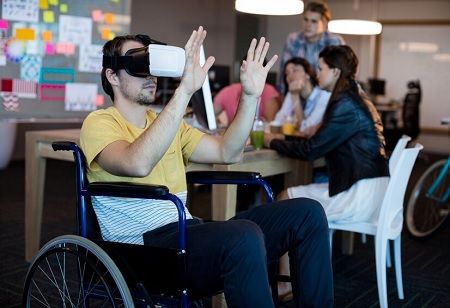
ICMR-Backed NCAHT Launches Innovative Assistive Technologies for Visually Challenged

 The National Centre for Assistive Health Technologies (NCAHT), with support from the Indian Council of Medical Research (ICMR), unveiled a range of assistive technology products for visually challenged individuals at the Indian Institute of Technology (IIT) Delhi. This initiative aims to enhance educational and mobility opportunities for people with visual impairments.
The National Centre for Assistive Health Technologies (NCAHT), with support from the Indian Council of Medical Research (ICMR), unveiled a range of assistive technology products for visually challenged individuals at the Indian Institute of Technology (IIT) Delhi. This initiative aims to enhance educational and mobility opportunities for people with visual impairments.
The newly launched products include Shapescapes, a geometry learning kit that helps visually challenged students understand geometric concepts through a do-it-yourself (DIY) approach. Designed with universal principles, Shapescapes is accessible to sighted, low-vision, and visually challenged users, providing a cost-effective solution to the challenges faced in teaching and learning geometry.
Another key product introduced is a high-quality white cane developed in collaboration with Kenstel Communications. This cane addresses the essential need for reliable and durable mobility aids, enabling visually challenged individuals to navigate their environment independently and safely.
Additionally, the accessible kit for STEM education offers visually challenged students resources to learn concepts in electronics, including logic gates and circuits. This kit includes a self-learning book featuring tactile diagrams, large print, and Braille, making STEM education more inclusive. Both the geometry learning kit and the STEM education kit will be produced by the Raised Lines Foundation, a non-profit social enterprise from IIT Delhi.
NCAHT also announced large-scale user trials for SmartCane Version 2 and a Refreshable Braille Display. Developed in collaboration with Saksham Trust, these innovations are designed to empower visually challenged individuals further. SmartCane Version 2 is an improved electronic travel aid, building on its predecessor, which is used by about 150,000 people worldwide. The new version offers enhanced usability and user experience, addressing previous limitations and adapting to modern needs.
The Refreshable Braille Display, developed by the Assistech Lab at IIT Delhi in collaboration with Phoenix Medical Systems and Saksham Trust, enables visually challenged users to access digital text in Braille format. This technology provides access to a wide range of reading materials, including those available from Sugamya Pustakalaya, India’s largest collection of accessible books.
Representatives from NCAHT highlighted the significant impact these innovations will have on improving the lives of visually challenged individuals. By focusing on universal design and inclusive education, these assistive technologies are set to make learning and mobility more accessible and effective for all. The launch of these products marks a crucial step in supporting the independence and educational advancement of the visually challenged community in India and beyond.